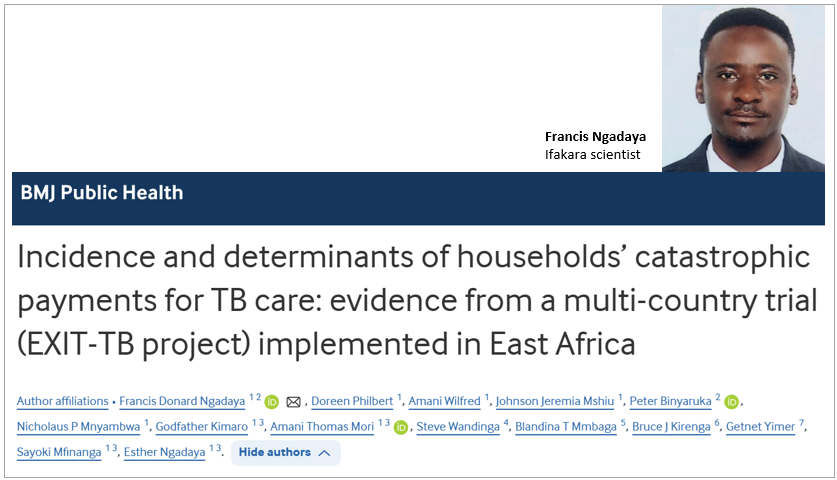
TB CARE: Uncovering the financial struggles of households in East Africa

Tuberculosis (TB) remains a leading cause of illness and death despite current progress and initiatives to control the disease in the sub-Saharan African region. For millions of people, particularly in East Africa, the disease is more than just a health crisis—it is a financial catastrophe that imposes a severe financial burden on affected households.
A recent study published on BMJ Public Health journal, conducted under the EXIT-TB project, sheds light on this alarming issue. The study reveals the financial hardship experienced by TB-affected households in four East African countries –Tanzania, Kenya, Uganda, and Ethiopia. Despite national TB programs in these countries offering free diagnosis and treatment, many patients and their families still face overwhelming costs that push them deeper into poverty.
Ifakara scientist leads the study
Leading the study is Ifakara Health Institute scientist Francis Ngadaya, with contributions from health economist Peter Binyaruka also from Ifakara. The two worked alongside colleagues from the National Institute for Medical Research (NIMR), Kampala International University (Tanzania), Kenya Medical Research Institute (Kenya), Kilimanjaro Christian Research Institute (Tanzania), Infectious Disease Institute (Uganda), Center for Innovative Drug Development and Therapeutic Trials for Africa (Ethiopia).
The cost of seeking TB care
The study found that, on average, TB patients incurred significant costs while seeking care: $130.85 in Tanzania, $97.90 in Kenya, $84.63 in Uganda, and $101.60 in Ethiopia. For many families living on limited incomes, these costs represent a devastating financial setback.
When healthcare becomes a financial crisis
Findings further showed that more than half of TB-affected households experienced catastrophic health expenditure (CHE) due to TB. CHE occurs when medical costs exceed 20% of a household’s annual income. Alarmingly, the study found that over half (51.81%) of TB-affected households in the four countries faced CHE.
“We found that the majority of TB-affected households spend more than 20% of their average annual household income on TB care and treatment services across countries, which is described as catastrophic. The rate is alarmingly high and this calls for the establishment of cost mitigation policies,” the scientists noted.
Households most affected by CHE included families with more than five members, Unemployed individuals, and Households where the TB patient is the primary breadwinner. Ethiopia showed the highest incidence of CHE among the four countries studied.
Why free TB services aren’t enough
Although TB treatment is free, indirect costs – such as transportation, food, lost income due to missed work, and additional medical expenses – add to the financial strain. These hidden costs often force patients to abandon treatment, leading to worsening health outcomes and transmission of TB within communities.
Moreover, the financial burden creates a vicious cycle: TB patients, already struggling economically, lose their ability to work, reducing household income and increasing financial instability. This reality not only affects individuals but also weakens community-wide efforts to eliminate TB and achieve universal health coverage (UHC).
A call for financial support, social protection
The study underscores the urgent need for policies that extend beyond free treatment but rather actively address the financial challenges faced by TB patients. Economic support and social protection measures are essential to easing the financial strain on TB-affected households, particularly the most vulnerable.
“The rate of CHE among TB-affected households is alarmingly high. This calls for the establishment of cost mitigation policies such as economic support and socio-protection interventions to address financial challenges among TB-affected households, particularly the worse-offs, to reduce the incidence of CHE and further impoverishment,” the scientists emphasized.
Addressing TB as both a health & economic challenge
The study’s findings highlight that TB care is not just a medical issue but also an economic and social one. To effectively combat TB, governments and global health organizations must invest in financial support programs that prevent households from falling into poverty due to healthcare costs. No one should have to choose between their health and their financial well-being.
Read the publication here.
